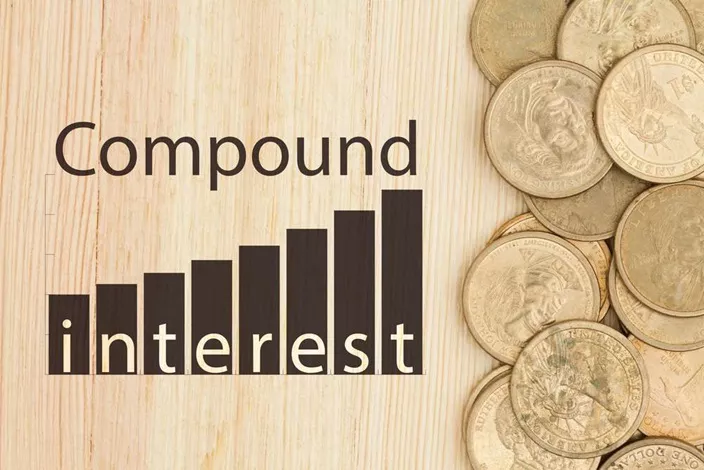Compound interest is a powerful way to grow your money over time. It allows you to earn interest not only on your initial investment but also on the interest that accumulates. The longer you invest, the more your money grows. But where should you put your money to earn compound interest? Let’s explore the best options.
1. High-Yield Savings Accounts
A high-yield savings account is a great place to earn compound interest with minimal risk. These accounts offer higher interest rates than traditional savings accounts and are usually available through online banks.
Benefits:
- Low risk and FDIC insured (up to $250,000 per depositor)
- Easy access to your funds
- Interest compounds daily or monthly
Best For:
- Short-term savings
- Emergency funds
2. Certificates of Deposit (CDs)
Certificates of deposit (CDs) offer higher interest rates than savings accounts in exchange for locking in your money for a fixed period. The longer the term, the higher the interest rate.
Benefits:
- Guaranteed returns
- FDIC insured (up to $250,000 per depositor)
- Higher interest rates than regular savings accounts
Best For:
- Low-risk investors
- Saving for specific future expenses (e.g., a down payment on a house)
3. Money Market Accounts
Money market accounts (MMAs) combine features of savings and checking accounts. They offer higher interest rates than regular savings accounts and may provide limited check-writing capabilities.
Benefits:
- Higher interest rates than traditional savings accounts
- FDIC insured (if offered by a bank)
- Liquidity with some access to funds
Best For:
- Investors who want higher interest rates but need occasional access to funds
4. Bonds and Bond Funds
Bonds are fixed-income securities that pay interest over time. Government, municipal, and corporate bonds can offer steady compound interest. Bond funds pool investments in multiple bonds for diversification.
Benefits:
- Regular interest payments
- Government and municipal bonds are tax-advantaged
- Lower risk compared to stocks
Best For:
- Conservative investors
- Diversified portfolios
5. Dividend-Paying Stocks
Some stocks pay dividends, which can be reinvested to earn compound interest. By reinvesting dividends, you increase the number of shares you own, leading to greater future dividends.
Benefits:
- Potential for capital appreciation and passive income
- Compound growth through dividend reinvestment
- Some dividends qualify for favorable tax treatment
Best For:
- Long-term investors
- Those seeking both income and growth
6. Exchange-Traded Funds (ETFs) and Mutual Funds
ETFs and mutual funds invest in a mix of stocks and bonds. Some funds automatically reinvest dividends and interest, allowing your investment to grow over time.
Benefits:
- Diversification reduces risk
- Many funds offer automatic reinvestment
- Professional management
Best For:
- Passive investors
- Those looking for diversified growth
7. Retirement Accounts (401(k), IRA, and Roth IRA)
Retirement accounts offer tax advantages while allowing your investments to grow through compound interest. Contributions may be tax-deductible (traditional IRA, 401(k)) or tax-free on withdrawal (Roth IRA).
Benefits:
- Tax advantages enhance growth
- Employer matching contributions (401(k))
- Long-term growth potential
Best For:
- Retirement savings
- Long-term investors
8. Real Estate Investment Trusts (REITs)
REITs are companies that own income-generating real estate. They pay dividends, which can be reinvested for compound growth.
Benefits:
- Passive income from dividends
- Potential for capital appreciation
- Exposure to real estate without owning property
Best For:
- Investors seeking passive income
- Those looking to diversify beyond stocks and bonds
9. Peer-to-Peer (P2P) Lending
P2P lending platforms allow you to lend money to individuals or businesses in exchange for interest payments. Your earnings can be reinvested for compound growth.
Benefits:
- Higher potential returns than traditional savings
- Can diversify your investments
- Some platforms allow automatic reinvestment
Best For:
- Investors are willing to take some risk
- Those seeking passive income
10. Cryptocurrency Staking and Interest Accounts
Some cryptocurrency platforms offer interest on digital assets through staking or lending. The interest is often higher than traditional banks but comes with higher risk.
Benefits:
- High potential returns
- Some platforms compound interest daily
- Passive income from crypto holdings
Best For:
- Investors are comfortable with crypto volatility
- Those seeking alternative investment opportunities
Conclusion
Earning compound interest is one of the best ways to grow your wealth over time. The right investment choice depends on your financial goals, risk tolerance, and time horizon. Whether you prefer the safety of high-yield savings accounts or the higher potential returns of dividend stocks and ETFs, there is an option for everyone.
Start investing early and consistently to maximize the benefits of compound interest. The sooner you begin, the more your money can grow!
Related Topics:


